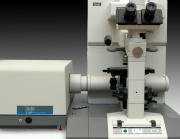Infrared spectroscopy
Description
The technique of infrared spectroscopy uses infrared radiation in the range from 4000 to 600 cm-1, the mid-infrared region, to observe the vibrational changes in chemical bonds. The presence and intensity of specific vibrational frequencies allows for determination of functional groups in organic molecules. The class of material (proteinaceous, cellulosic, and so forth) can then be identified from these functional groups. Infrared spectroscopy serves as a first step to more complete identification using other techniques. The system at the National Gallery of Art is equipped with a microscope, and samples are examined in transmitted or reflected light modes. A micro-attenuated total reflectance (ATR) attachment for the microscope is also available for studying the composition of thin coatings, such as the varnish on a painting or photograph.
Synonyms and Related Terms
Infrarotspektroskopie (Deut.); spectrométrie infrarouge (Fr.);
Additional Information
- M.Derrick, D.Stulik, J.Landry, Infrared Spectroscopy in Conservation Science, In Scientific Tools for Conservation series, Getty Conservation Institute, Los Angeles, 1999.
